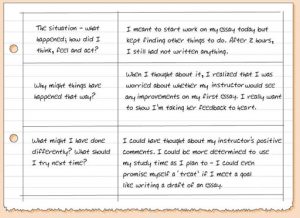Each day every person learns something new, no matter the intention and awareness of the lesson. It is known that improvements are made by learning and applying knowledge, but what does that actually mean?
For students it is expected that they will learn by listening to an instructor and for faculty and staff to learn from experiences and mistakes. However, that is only half of the learning process. If reflection is not made a part of experience then nothing can possibly be learned. For instance, if students do not study the material outside of class (reflection) then they will not fully understand the material and will not have learned to their full potential. Similarly, if faculty and staff do not reflect on their work then nothing can be improved or learned from the experiences. When given the choice, people normally prefer doing over thinking. Although it seems more productive to be constantly doing, it is actually more valuable to reflect as it effects efficacy and understanding of the task.
Here in the Office of Continuous Improvement, we strive to continuously improve through reflection, and later implementation of what we learned into the processes that we are trying to improve. Often we use a tool called Learning Journals to reflect.
Learning journals are quite literally a journal to write in before, during and after an experience. The content of the journal should be focused on identifying areas that you would like to explore in more detail and get a better understanding of. Here are some examples of things you might write to improve:
-Support learning from experience
-Develop critical thinking and/or a questioning attitude
-Encourage awareness of our own learning processes
-Increase ability in reflection and thinking
-Enhance problem solving skills
-Support personal development and self-empowerment
-Enhance creativity
-Support planning and progress
Inside of each category you can ask individual questions to reflect on an experience. For students you can ask questions in class such as:
- What were the main points I learned from this session?
- What is something I learned in this session that I may be able to use in my future?
- After completing an assignment it could be useful to ask:
- What strategies did I use as I was working on the assignment?
- What do I need to do to overcome these uncertainties?
- To improve at work you can ask yourself:
- What mistakes did I make? Why did I make them?
- How do I feel about the way I handled things today?
- What resources helped me be successful?
Interested in starting a personal learning journal to help you improve your ability to learn? The Office of Continuous Improvement is here to provide assistance and to answer any questions you may have. Check out our website or stop by our office in 136 W Wads.
Sources:
https://drive.google.com/file/d/0B46HHziBnQeTZm92M2Nhd3NTMHc/view
University of Worcester. “Learning Journals .” Google, Google, 2016, drive.google.com/file/d/0B46HHziBnQeTZm92M2Nhd3NTMHc/view.
Open Learn. http://www.open.edu/openlearn/education/learning-learn-learning-can-mean-change/content-section-5.1
https://drive.google.com/file/d/0B46HHziBnQeTQkZvb2lqRzRaQ28/view
Stefano, Giada Di, et al. “Making Experience Count.” Google, Google, drive.google.com/file/d/0B46HHziBnQeTQkZvb2lqRzRaQ28/view.

I have been working on my own reflective writing, so framing this in terms of a learning journal is helpful to me. Thanks for the post, it was very informative.